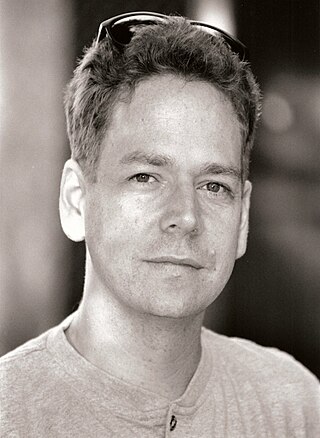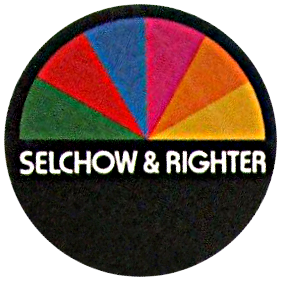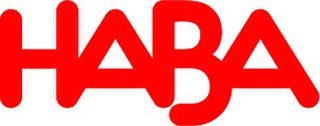Coleco Industries, Inc. was an American company founded in 1932 by Maurice Greenberg as The Connecticut Leather Company. It was a successful toy company in the 1980s, mass-producing versions of Cabbage Patch Kids dolls and its video game consoles, the Coleco Telstar dedicated consoles and ColecoVision. While the company ceased operations in 1988 as a result of bankruptcy, the Coleco brand was revived in 2005, and remains active to this day.

Twister is a game of physical skill produced by Milton Bradley Company and Winning Moves Games USA. It is played on a large plastic mat that is spread on the floor or ground. The mat has four rows of six large colored circles on it with a different color in each row: red, yellow, green and blue. A spinner tells players where they have to place their hand or foot. The game promotes itself as "the game that ties you up in knots".

Bandai Co., Ltd. is a Japanese multinational toy manufacturer and distributor headquartered in Taitō, Tokyo. Its international branches, Bandai Namco Toys & Collectables America and Bandai UK, are respectively headquartered in Irvine, California and Richmond, London. Bandai is a subsidiary of Bandai Namco Holdings and is the parent company's core toy production division. From 1981 until 2001, Bandai produced video game consoles.

THQ Inc. was an American video game company based in Agoura Hills, California. It was founded in April 1990 by Jack Friedman, originally in Calabasas, and became a public company the following year through a reverse merger takeover. Initially working in the toy business, it expanded into the video game business through several acquisitions before shifting its focus away from toys entirely. THQ continued its trend of acquiring companies throughout the 2000s.

Paul Reiche III is an American game designer, particularly known for his work on video games. Reiche is best known for being the co-creator, together with Fred Ford, of the Star Control universe.

Sega Sammy Holdings Inc. is a Japanese global holding company formed from the merger of Sega and Sammy Corporation in 2004. Both companies are involved in the amusement industry.

Gashapon (ガシャポン), also called gachapon (ガチャポン), is a trademark of Bandai. Among the variety of vending machine-dispensed capsule toys that originated in the 1960s, it became popular in Japan and elsewhere. "Gashapon" is onomatopoeic from the two sounds "gasha" for the hand-cranking action of a toy-vending machine, and "pon" for the toy capsule landing in the collection tray. "Gashapon" is used for both the machines themselves and the toys obtained from them. Popular capsule toy manufacturers include Tomy, which uses the trademark gacha for their capsule machines, and Kaiyodo. In many countries including Japan, China, United States and the United Kingdom, "Gashapon" is a registered trademark of Bandai. The model of capsule toy has been adapted digitally into numerous gacha video games, such as mobile phone games and massively multiplayer online games (MMOs).
Camerica was a Canadian video game company founded in 1988. It released various unlicensed video games and accessories for the Nintendo Entertainment System, such as the Game Genie, and was the North American publisher for British developer Codemasters.
Square Enix Limited is a British subsidiary of the Japanese video game company Square Enix, acting as their European publishing arm. The company formerly owned Tomb Raider, which it purchased with CentreGold in 1996, and Crystal Dynamics, which it acquired in 1998, among numerous other assets. Aforementioned studios and series were sold by its parent company to Embracer Group in 2022. Other published games series include the Championship Manager debuted in 1992 and Hitman from 2000 to 2017. Square Enix Limited and fellow group company Square Enix Incorporated shared Phil Rogers as CEO and other executives from 2013 to 2022.

A video game clone is either a video game or a video game console very similar to, or heavily inspired by, a previous popular game or console. Clones are typically made to take financial advantage of the popularity of the cloned game or system, but clones may also result from earnest attempts to create homages or expand on game mechanics from the original game. An additional motivation unique to the medium of games as software with limited compatibility, is the desire to port a simulacrum of a game to platforms that the original is unavailable for or unsatisfactorily implemented on.
Toys for Bob, Inc. is an American video game developer based in Novato, California. As the creators of the award-winning Star Control and Skylanders series, the studio originated as a partnership between Paul Reiche III and Fred Ford. They had separately attended the University of California, Berkeley in the late 1970s, before entering the video game industry in the early 1980s. They later met through mutual friends in 1988, when Reiche was seeking a programmer to develop Star Control for Accolade. This led to the creation of their partnership in 1989 and the debut of Star Control in 1990. The release was considered a landmark science fiction game and led to the 1992 sequel Star Control II, which greatly expanded the series' story and scale. Star Control II is celebrated as one of the greatest games of all time and is featured on several "best of" lists for music, writing, world design, and character design.
Barrel of Monkeys is a toy game released by Lakeside Toys in 1965. It was created by Leonard Marks and Milton Dinhofer in 1961, and in 1964, Herman Kesler partnered to sell it to Lakeside Toys. Lakeside Toys released it in 1965 and today it is produced by the Milton Bradley Company within the Hasbro corporation. Milton Bradley's editions consist of a toy barrel in either blue, yellow, red, purple, orange, gray or green. The barrel contains 13 monkeys but can hold 24, their color usually corresponding to the barrel's color. The instructions state, "Dump monkeys onto table. Pick up one monkey by an arm. Hook other arm through a second monkey's arm. Continue making a chain. Your turn is over when a monkey is dropped." In addition to these basic instructions, the barrel also contains instructions for playing alone or with two or more players.

Selchow and Righter was a 19th- and 20th-century game manufacturer best known for the games Parcheesi and Scrabble. It was based in Bay Shore, New York.

Habermaaß GmbH is a German toy manufacturing company based in Bad Rodach, Bavaria. The company defines itself as an “Inventor for inquisitive minds”, offering a broad selection of products such as wooden and textile toys, home furnishings and accessories for babies and children. Today the company is still a family run company, under the leadership of the managing partner Klaus Habermaaß and the managing director Harald Grosch.

Mega Brands Inc. is a Canadian children's toy company currently owned by Mattel. Mega Bloks, a line of construction set toys, is its most popular product. Its other brands include Mega Construx, Mega Puzzles, Board Dudes and Rose Art. The company distributes a wide range of construction toys, puzzles, and craft-based products.
Edge Games, Inc. is an American video game developer and publisher headquartered in Pasadena, California, best known for the practices of its founder and chief executive officer, Tim Langdell, in enforcing trademarks relating to the word "edge", which sources have described as "litigious". Langdell has defended these practices, stating that Edge has only sued two companies since the late 1980s.

Bananagrams is a word game invented by Abraham Nathanson and Rena Nathanson of Cranston, Rhode Island, wherein lettered tiles are used to spell words.

Schaper Toys, or W.H. Schaper Mfg. Co., Inc. as it was originally known, was a game and toy company founded in 1949 by William Herbert Schaper in Robbinsdale, Minnesota. "Herb" Schaper published a variety of games but was best known for having created the children's game, Cootie. In 1971, the company was sold to Kusan, Inc., and began operating as Schaper Toys, a subsidiary of Kusan, Inc. In 1986, Schaper Toys was acquired by Tyco Toys, which sold the rights to Cootie and three other of the company's best-known games to the Milton Bradley Company. These games are still being sold.

The Game of Cootie is a children's dice rolling and set collection tabletop game for two to four players. The object is to be the first to build a three-dimensional bug-like object called a "cootie" from a variety of plastic body parts. Created by William Schaper in 1948 and based on the traditional dice game Beetle, the game was launched in 1949 and was commercially successful, with copies totalling more than one million in the first few years. In 1973, Cootie was acquired by Tyco Toys, and, in 1986, by Hasbro subsidiary Milton Bradley. The game was given a new look and continued to enjoy commercial success. Several companies published cootie games in the first half of the twentieth century, but only Schaper's featured a free-standing, three-dimensional cootie. In 2003, Cootie was named to the Toy Industry Association's "Century of Toys List".
WhiteBoard Product Solutions is a product development consultancy based in the Minneapolis/St. Paul area that helps clients develop and launch new products. WhiteBoard develops products in multiple categories including medical devices, commercial products, electronics, sports equipment, household goods, soft goods, and toys. Product development services offered by WhiteBoard include industrial design, engineering, prototyping, packaging, and graphic design.












